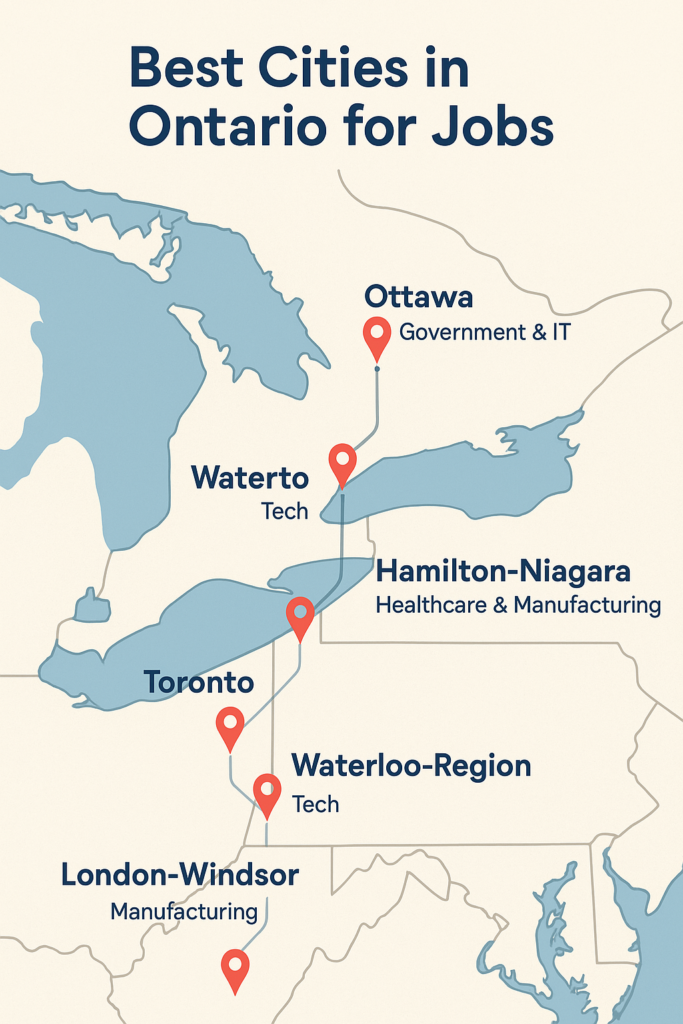The jobs in Ontario 2025 landscape is a dynamic one, offering a wealth of opportunities for job seekers across a diverse range of industries. From high-tech innovation in its major cities to a steady demand for skilled professionals in its manufacturing and healthcare sectors, Canada’s most populous province is a hub of economic activity. This guide breaks down exactly where to look for work, what salaries to expect, and what key hiring trends are shaping the future of employment in Ontario for newcomers, students, and experienced professionals alike. You’ll find insights on top-performing sectors, key hiring cities, and practical strategies to help you land your next role.
Ontario’s job market in 2025
The Ontario job market is expected to see steady and sustained growth in 2025, driven by population growth, ongoing infrastructure investment, and a continued push for technological innovation. This stability provides a more predictable environment for job seekers compared to the volatility of recent years. Key economic drivers include a robust tech ecosystem, an aging population creating demand in healthcare, and a strong push for skilled trades to support both residential construction and advanced manufacturing.
While the Greater Toronto Area (GTA) remains the largest job market, other regions are seeing significant hiring. Cities like Ottawa continue to grow in the tech and government sectors, while the Kitchener-Waterloo (KW) region is a global leader for startups and AI. Additionally, mid-sized cities like London, Hamilton, and Windsor are emerging as key hubs for manufacturing, logistics, and healthcare, offering a more affordable lifestyle with excellent career prospects.

Where the jobs are by sector
Understanding which industries are expanding is crucial for any job search. Ontario’s economy is powered by several key sectors, each with unique hiring needs and salary expectations.
Technology and software
The tech industry is a cornerstone of Ontario's economy, with Toronto and Waterloo leading the way. The demand for IT professionals remains strong, with a focus on roles in software engineering, data analytics, cloud computing, and artificial intelligence. Employers value a strong portfolio of practical projects and a resume optimized for Canadian standards.
Entry-level salaries for junior developers often range from CAD 60,000–85,000, with experienced professionals earning CAD 95,000–140,000+.

Healthcare and life sciences
The healthcare sector is under significant pressure to meet the needs of an aging and growing population. Hospitals, clinics, and long-term care facilities are hiring for a wide range of roles. Job seekers will find consistent demand for professionals like nurses, allied health professionals, lab technicians, and administrative staff. Licensing and local experience are often essential for success.
Salaries for nurses typically range from CAD 65,000–100,000, while technologists can earn CAD 55,000–85,000, with specialized roles paying significantly more.

Skilled trades and manufacturing
Ontario's manufacturing sector, particularly in automotive and advanced manufacturing, is experiencing a resurgence. This creates a high demand for skilled professionals who can work with advanced machinery. From automotive to food processing, companies are actively seeking roles like electricians, millwrights, welders, and machinists.
Many skilled trades positions offer salaries ranging from CAD 55,000–95,000, with higher earnings possible through overtime and shift premiums.

Finance, banking, and fintech
Toronto remains Canada's financial heart, with major banks, insurance companies, and fintech startups driving the economy. The city's financial core is a top destination for professionals in financial analysis, risk management, auditing, compliance, and product management within the booming fintech space.
Analysts can expect salaries between CAD 60,000–90,000, while experienced managers often earn CAD 100,000–150,000+, depending on their team and bonus structure.

Logistics, warehousing, and supply chain
The boom in e-commerce and a renewed focus on supply chain efficiency are fueling a strong market for logistics professionals. Hiring is robust for roles like warehouse associates, dispatchers, and transportation coordinators. The need for efficient delivery and inventory management systems makes this a stable sector.
Many roles pay between CAD 40,000–70,000, with supervisory positions often exceeding CAD 80,000.

Education and public sector
As the population grows, so does the need for educators and public service professionals. School boards and various government agencies at the provincial and municipal levels are actively recruiting. The public sector offers stable careers for those in teaching, administrative support, and policy development.
Salaries for assistants typically range from CAD 35,000–55,000, while teachers can earn CAD 55,000–100,000 based on their experience and the school board.

Green energy and construction
Ontario's push for green energy and ongoing infrastructure projects are creating a strong job market in construction and engineering. Major transit projects, housing developments, and renewable energy initiatives require a skilled workforce. Job seekers can find opportunities in project management, civil engineering, and various on-site roles.
Project coordinators earn between CAD 55,000–80,000, while project managers with experience can command CAD 90,000–140,000+, depending on the project scope and city.

Best cities in Ontario for jobs
While the entire province has opportunities, some cities stand out as major hiring hubs. These urban centers are the driving force behind the province’s diverse economy.
Toronto: As a global financial and tech hub, Toronto offers a high concentration of corporate, IT, and creative jobs. It is ideal for experienced professionals and those in specialized roles, though competition can be fierce.

Ottawa: The nation's capital has a stable job market driven by the federal government and a booming technology sector. It’s an excellent choice for those in IT, engineering, and public administration.

Waterloo Region: Known as the "Silicon Valley of the North," this region is home to a thriving tech startup scene and major companies. It’s a top destination for IT jobs in Canada, offering innovation and career growth outside of a major metropolis.

London-Windsor: These cities are hubs for manufacturing, particularly in the automotive industry, and are experiencing growth in healthcare and logistics. They offer a stable job market and a lower cost of living, making them an attractive option for many job seekers.

Hamilton-Niagara: This region’s economy is rapidly diversifying, with strong demand in healthcare, manufacturing, and logistics. It provides a more affordable alternative to the GTA with robust employment prospects.

How to get hired fast in Ontario
Landing a job in a competitive market like Ontario requires more than just a resume. It demands a strategic approach to finding and applying for roles.
Optimize your resume: A well-crafted resume is your ticket to an interview. Use an AI Resume Builder to create a document that is tailored to specific job descriptions and optimized for applicant tracking systems (ATS). This ensures your application doesn’t get lost in the digital shuffle and stands out to human recruiters. For more specific advice, our guide on writing a Canadian resume can help you align with local standards.
Prepare for the interview: Acing the interview is the final step to landing the job. Practice your answers to common behavioral and technical questions, and be ready to showcase your skills. Use our AI Job Interview Prep tool to run mock interviews and get instant feedback on your performance, tone, and confidence. This can significantly improve your chances of success.
Leverage your network: Many job openings are filled through referrals and professional connections before they are ever publicly advertised. Join online professional groups, attend industry events, and connect with recruiters and hiring managers on social platforms. Networking is a powerful way to uncover hidden opportunities.

FAQs about jobs in Ontario
Which sectors are hiring the most in Ontario in 2025?
The sectors hiring the most in Ontario in 2025 are healthcare, technology, and skilled trades. Other growth areas include finance, logistics, and construction, driven by sustained economic activity and infrastructure projects.
What is a good salary in Ontario in 2025?
A good salary in Ontario in 2025 depends on the city and profession. While an annual income of CAD 70,000–90,000 is considered a strong salary in many parts of the province, in a city like Toronto, a salary of over CAD 100,000 is often needed for a comfortable lifestyle.
Where are the best cities in Ontario for jobs?
The best cities for jobs in Ontario include Toronto for finance and tech, Ottawa for government and IT, and the Waterloo Region for tech startups. For those seeking a lower cost of living, Hamilton and London offer stable job markets in healthcare and manufacturing.
Are there remote jobs in Ontario?
Yes, remote jobs are widely available in Ontario. Many companies continue to offer hybrid or fully remote positions, particularly in the tech, marketing, and professional services sectors. Flexible work arrangements are a key trend in the 2025 Ontario job market.
How can newcomers find jobs in Ontario?
Newcomers can find jobs by getting their credentials recognized, building a professional network, and volunteering or taking local courses to gain Canadian experience. It's also vital to create a resume tailored to Canadian standards.
What skills help you get hired faster in Ontario?
Technical skills in areas like data analytics, AI, and cybersecurity are in high demand. Soft skills like communication, collaboration, and adaptability are also highly valued by employers across all sectors.

For more information, visit these official government sources:
Conclusion
The jobs in Ontario 2025 market is rich with potential, offering stability and growth across a diverse range of sectors and cities. By understanding the key hiring trends, focusing on in-demand industries, and leveraging modern job search tools, you can position yourself for success. Whether you are an experienced professional, a newcomer, or a recent graduate, the province provides a wealth of opportunities to build a rewarding career. To begin your job search and find the perfect role, start exploring listings on Dr. Job. You can also get a head start by using our AI Salary Checker to ensure you are earning what you're worth.

Author
Suleiman Alnsour | Dr. Job Pro Editorial Team
We analyze Canada’s job market and employer hiring trends to help you land the right role faster. Our guides combine salary research, sector insights, and practical application tips. Visit us to explore Canada jobs.









 2025-11-28
2025-11-28
 2025-11-24
2025-11-24
 2025-11-18
2025-11-18
 2025-11-11
2025-11-11
 2025-11-10
2025-11-10